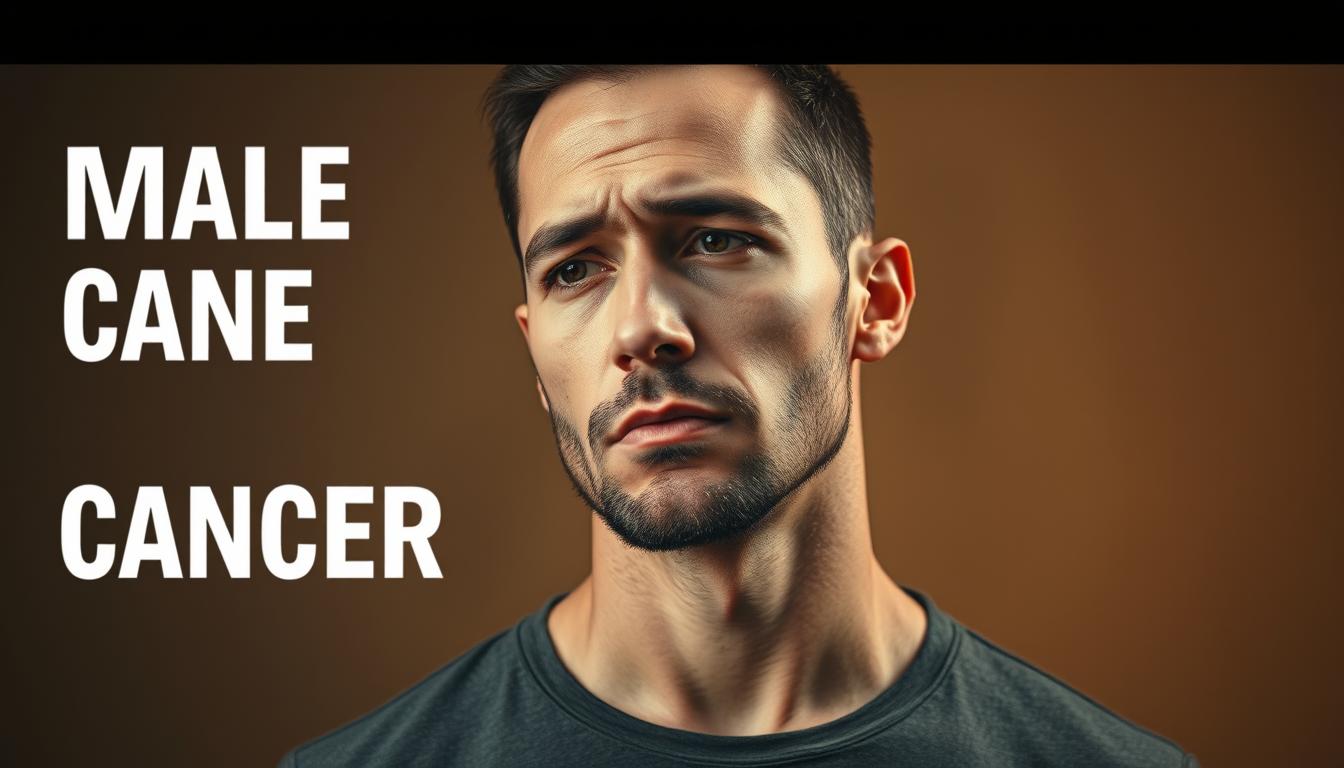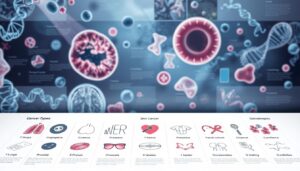Being informed about men’s health is more than helpful; it’s essential. With more focus on male cancer awareness, it’s vital for men in the U.S. to know about cancer symptoms and prevention. Men face unique health challenges and risks, but knowing about them can help prevent many issues.
Understanding cancer in men is key to saving lives. We aim to provide insights that can make a difference. This includes knowing about risk factors, common cancers, and how to stay healthy.
This article will help you understand early detection and the importance of not ignoring symptoms. We’ll also cover the latest in treatment options. Our goal is to help you take control of your health for a better future.
Key Takeaways
- Importance of male cancer awareness in managing health risks.
- Educate on the impact of cancer on men’s health in the United States.
- Understanding the common symptoms, risk factors, and prevention measures.
- Highlighting the vital role of early detection in successful treatment outcomes.
- Offering guidance on navigating diagnosis, treatment, and recovery processes.
Understanding the Risk Factors of Cancer in Men

Exploring the many factors that lead to cancer helps men prevent and detect it early. First, let’s look at genetic predispositions that greatly affect these risks.
Genetic Predispositions
Men with a family history of cancer face higher risks, known as hereditary cancer. Genes like BRCA1 and BRCA2, often linked to breast cancer in women, also raise cancer risks in men. This includes prostate and pancreatic cancers.
Lifestyle and Environmental Factors
Lifestyle choices and environmental exposure are key in cancer development. Smoking, drinking too much alcohol, and a sedentary lifestyle increase cancer risk. Also, exposure to carcinogens like asbestos or UV radiation greatly raises the risk.
Age-Related Risks
Aging and cancer are closely linked, with most cancer diagnoses in men over 50. As cells age, they degenerate, and longer exposure to risks increases cancer risk.
In conclusion, knowing how genetics, lifestyle, environment, and aging interact is vital for managing cancer risk. It helps in creating targeted prevention strategies for men.
The Most Common Types of Cancer in Men
Men face many health threats, but some cancers are more common. We’ll look at prostate, lung, and colorectal cancers. These cancers are big health risks. They show why we need to know about prostate cancer, lung cancer risks, and colorectal cancer screening.
Prostate Cancer
Prostate cancer is the most common cancer in men. It’s very important to catch it early. This can greatly lower death rates. We need to spread the word and help men take care of their health.
Lung Cancer
Lung cancer is very deadly, with smoking being a big cause. But, pollution and genes also play a part. It’s key for smokers and others to know the risks and get checked regularly.
Colorectal Cancer
Screening for colorectal cancer can really help. It’s treatable if caught early. Eating right and getting tested often are key steps. Teaching people about signs and tests can help fight this cancer.
| Cancer Type | Key Risk Factors | Importance of Screening |
|---|---|---|
| Prostate Cancer | Age, family history, race | Early detection through PSA testing |
| Lung Cancer | Smoking, pollutants, genetics | CT scans for smokers and high-risk groups |
| Colorectal Cancer | Diet, age, family history | Colonoscopy screenings after age 50 |
Early Detection and Prevention Strategies
Being proactive in cancer detection and prevention can greatly improve treatment success. It’s important to have regular cancer screenings, take preventative health measures, and know how vaccines in cancer prevention work. These steps help lower cancer risk in men.
Regular screenings and medical check-ups are key to catching cancer early. This is when it’s most treatable. Health experts recommend screenings based on age and risk factors. For example, the American Cancer Society suggests HPV vaccinations and lung cancer screening for smokers to cut down on deaths.
- Regular monitoring and screenings can lead to early diagnosis, which is vital for better treatment outcomes.
- Men should talk to their doctors about their risk for prostate cancer to make informed decisions about screenings.
Living a healthy lifestyle is another important part of preventing cancer. This means eating well, exercising, and avoiding tobacco and too much alcohol. These habits help prevent cancer and improve overall health.
Vaccines are also key in cancer prevention by protecting against infections that can lead to cancer. It’s important to educate men about the importance of vaccines like Hepatitis B and HPV, which can prevent several types of cancer.
By using these strategies, we can greatly reduce cancer risk and help men live healthier, longer lives. It’s essential to spread awareness and education about these preventative measures in the fight against cancer.
Symptoms Men Should Not Ignore
Many men don’t know about health symptoms in men that need quick medical help. Ignoring them can make cancer detection and treatment harder, and worse.
- Unexplained weight loss: Losing weight without trying can be a sign of several types of cancer.
- Persistent unexplained pain: Pain lasting more than a month or accompanied by other symptoms could point to something more serious.
- Changes in bowel habits: This includes persistent diarrhea or constipation and a change in the consistency of stool.
- Unusual bleeding: Unexplained bleeding, whether in urine, stool, or coughing blood, should never be overlooked.
- Lumps or thickening in any part of the body: Noticeable changes in body texture can indicate cancerous growths.
Spotting these health symptoms in men early can help catch cancer sooner. If you notice any of these signs, see a doctor right away.
Treatment Options for Men with Cancer
The journey through cancer diagnosis to treatment offers many options. Each one is tailored to the individual’s needs. Recent cancer treatment advancements have broadened these choices. They mix traditional methods with new cancer therapies. This section looks at the varied treatments that use these advancements. It highlights the importance of personalized cancer care.
Traditional cancer treatments for men include surgery, chemotherapy, and radiation therapy. But now, we also have immunotherapy and targeted treatments. These new treatments focus on cancer cells without harming normal cells. This reduces side effects and makes recovery faster.
Emerging Technologies and Personalized Approaches
One big cancer treatment advancement is personalized cancer care. It creates treatments based on a patient’s genetic makeup and tumor genetics. This approach makes treatments more effective and safer for the patient.
With emerging technologies, we are now able to offer more customized and effective treatment options to our patients, significantly improving outcomes in prostate, lung, and colorectal cancers among men.
Here’s a closer look at these therapies:
| Treatment Type | Description | Benefits |
|---|---|---|
| Immunotherapy | Boosts the body’s natural defenses to fight the cancer | Targets only cancer cells, minimal side effects |
| Targeted Therapy | Uses drugs or other substances to precisely identify and attack cancer cells | Highly effective with fewer side effects compared to chemotherapy |
| Chemotherapy | Uses drugs to kill rapidly dividing cancer cells | Effective for a wide range of cancers |
As we see more cancer treatment advancements, new cancer therapies offer hope. They give patients a chance at a healthier, cancer-free future through personalized cancer care.
Cancer male: Navigating Diagnosis, Treatment, and Recovery
Getting a cancer diagnosis can change a man’s life a lot. It brings unique challenges and needs a strong support system. Knowing the cancer journey well is key to managing the disease and living well despite it. We will look at good ways to coping with cancer and finding cancer support for men.
The first news of cancer can make you feel overwhelmed and confused. It’s important to get all the facts. You can find helpful info through coping strategies and treatment paths. These resources help you understand your options, possible side effects, and how it will affect your daily life.
- Write down your questions and worries to talk to doctors about.
- Think about how much info you want about your diagnosis and treatments.
- Look into support groups, like those for men with cancer, for help.
Keeping a healthy diet and exercising regularly can help a lot. It can improve your physical and mental health. This can help manage side effects and speed up recovery.
Remember, taking care of your mental health is just as important as your physical treatment. Talking to counselors or joining men’s support groups can help a lot.
Also, the cost of cancer treatment can be a big worry. It’s important to plan for this and look for financial help for cancer patients.
The main goal is to not just survive but to thrive. Having a strong support system, including medical, emotional, and financial help, is key to this journey.
Conclusion
We’ve covered a lot about cancer risks, types, and how to prevent them in men. The main point is clear: awareness and proactive health management are key. Preventing cancer in men is possible with steps like genetic screening and watching lifestyle and environment.
We also talked about common cancers in men, like prostate, lung, and colorectal cancer. Early detection is very important. By following screenings and making healthy choices, men can lower their cancer risk.
For men dealing with cancer, this article offers hope and support. It shows how medical science keeps improving. This gives hope for a better future.
This conversation is about empowering men to take control of their health. It’s not just about facts. It’s about inspiring change and hope for a healthier tomorrow. With more awareness and action, we can make a big difference in reducing cancer and improving men’s lives.




